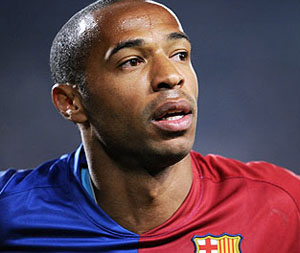Henry misses out on opportunity to become a champion
 Hamburg - French striker Thierry Henry has won just about everything there is to win in football.
Hamburg - French striker Thierry Henry has won just about everything there is to win in football.
In 1998 he was a member of the French side that won the World Cup, he won league titles in France, England and Spain, he has won domestic cup competitions and he has won winners' medals in the European championship and the Champions League.
On Wednesday, he had an opportunity to become a real champion.
It was an opportunity he did not take.
In the return leg of the World Cup play-off between France and Ireland in the Stade de France in Paris, the visitors were leading 1- 0 and had forced the game into extra time - having lost the first leg in Dublin at home on Saturday 1-0.
In the 13th minute of extra time, a free-kick was sent high into the Irish area and was heading out of play when Henry, who was being challenged by an Irish defender, first stoped the ball with his hand and then controlled it forward with his hand to his foot.
The Barcelona striker then pushed the ball to team-mate William Gallas, who had a simple task of tapping in from a metre or two off the line.
Irish goalkeeper Shay Given led vociferous protests to Swedish referee Martin Hansson, who pointed to the centre circle and gave the goal.
France held on to the draw and qualified for the finals next year in South Africa, while Ireland were knocked out.
Not surprisingly, the Irish squad felt cheated and striker Kevin Doyle said that the mood in the change room was very downbeat.
"Everyone is just gutted and not much is being said.
"To see that goal afterwards is just sickening. Whatever you want to say about the referee not seeing it, the linesman had the best view apart from Shay Given and it was not even a hand by the side, it was a hand out."
Irish assistant coach Marco Tardelli, who himself was a World Cup winner with Italy, said that the game needed a champion on the pitch.
"I think the game just needed one good champion. Henry is a very good champion but he should have said 'I took the ball with my hand'.
"He should have done that for football. Not so that we can win the match, it is just very important for football. To score such a goal and then cheer so much is not good. Not good for football. The referee could simply have gone to Henry and asked him."
Tardelli said that they had not wanted any presents from the game. "We just wanted a fair chance and we did not get it."
Ireland coach Giovanni Trapattoni said that the game had been very bad for the concept of fair play. "What we saw in the game had nothing to do with fair play.
"It is so sad to lose a game like this, it should not happen. We are always told about fair play."
He said that he would have preferred to go out on penalties. "I am sad because the referee had the time to ask the linesman and Henry."
Henry admitted after the game that he had handled the ball. "I will be honest, it was a handball," adding that the referee should be asked why it was allowed.
"I played it, the referee allowed it. That's a question you should ask him."
Had referee Hansson gone to Henry and asked him, the striker could have followed in the footsteps of Germany forward Miroslav Klose who, in a league game during which the score was still goalless, said that a foul on him, for which a penalty had been awarded, had not been a foul. The referee then changed his decision.
For this act Klose was awarded a Fairplay award.
The sports' controlling body FIFA also awards a Fairplay award, which German player Frank Ordenewitz once received after he admitted that he handled the ball in the area.
Henry, of course, was not asked and as a result the goal stood and the Irish were knocked out while the French went through, sparking wild celebrations by the French players and their coach Raymond Domenech.
Ironically, Domenech told FIFA. com a few weeks ago that he considered fair play an integral part of the game.
"Fair play is the best possible value to possess it means that respect should be an integral part of football, at all levels: respect for opponents, team-mates, the referee, fans, and therefore yourself.
"This is essential, as without it the result would outweigh the pleasure of playing. Although it is very important, winning is not the only thing that counts at the end of the match."
For the Irish it would seem though that the only thing that the French cared about in the Stade de France on Wednesday night was winning at all costs.
During that match Thierry Henry could have set a signal that fair play is important. Had he done so, he would have become a real champion. (dpa)